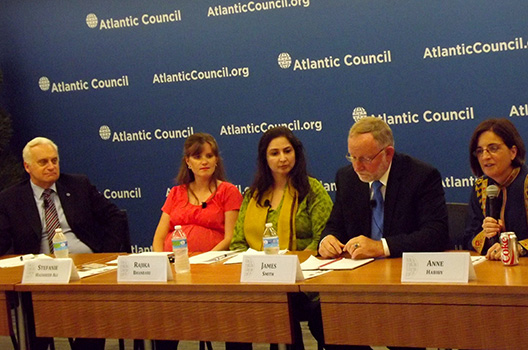 On July 21, 2015, the Atlantic Council’s Rafik Hariri Center for the Middle East hosted a roundtable to discuss the King Abdullah Scholarship Program and its potential to influence the future of Saudi Arabian foreign policy. The panelists included Hariri Center Associate Director Stefanie Hausheer Ali, Institute of International Education Deputy Vice President Rajika Bhandari, King Salman Center for Innovative Government Director Anne Habiby, King Salman Center for Innovative Government Research Associate Samar Alawami (via Skype), and former US Ambassador to Saudi Arabia James Smith. Hariri Center Director and Atlantic Council Vice President Francis Ricciardone moderated.
On July 21, 2015, the Atlantic Council’s Rafik Hariri Center for the Middle East hosted a roundtable to discuss the King Abdullah Scholarship Program and its potential to influence the future of Saudi Arabian foreign policy. The panelists included Hariri Center Associate Director Stefanie Hausheer Ali, Institute of International Education Deputy Vice President Rajika Bhandari, King Salman Center for Innovative Government Director Anne Habiby, King Salman Center for Innovative Government Research Associate Samar Alawami (via Skype), and former US Ambassador to Saudi Arabia James Smith. Hariri Center Director and Atlantic Council Vice President Francis Ricciardone moderated.
Ms. Ali began with an overview of the scholarship program, and specifically looking at the exponential growth in the number of Saudi nationals in the American education system in recent years. She highlighted that the Kingdom of Saudi Arabia is now the country with the fourth largest number of students living abroad, and that there are currently upwards of 100,000 Saudis studying in the United States. Additionally she mentioned that 30 percent of all Saudi scholarship students are women, suggesting that this is indicative of changing Saudi attitudes about women and their role in society.
Dr. Bhandari presented a broader view of international education programs and scholarships. She explained that there are an estimated 183 nationally funded scholarship programs around the world for international study, and that these programs focus primarily on the advancement of knowledge in developing and developed nations, and include a government service requirement. She highlighted the work of the Ford Fellows Program, noting its focus on impact assessment over the long term.
Ms. Habiby gave an overview of the King Salman Center for Innovative Government and its work, and introduced one of the new think tank’s researchers, Samar Alawami. Ms. Alawami is a Saudi national and recent graduate of American University thanks to a King Abdullah scholarship. She spoke about her experience as a Saudi student in the United States and praised the scholarship program as a catalyst for meaningful cultural exchange and a way for young Saudis to bring fresh ideas to their country. She also spoke about the utility of internships to prepare for professional life upon graduation.
Ambassador James Smith shared his perspective on the program, having been involved in the early stages of its development. He stressed the importance of limiting bureaucracy to facilitate more student exchanges, and of the United States presenting itself as open to Saudi students, rather than closed-off or inhospitable.
The question and answer section began with Ambassador Ricciardone asking Ms. Alawami whether the scholarship had limited her ability to study certain topics, alluding to the common conception that Saudi Arabia is a conservative country. Ms. Alawami responded that she was encouraged to study a variety of subjects, including politics. Other questions concerned the job market in Saudi Arabia and engagement of the scholarship’s alumni, both in Saudi Arabia and the United States.
